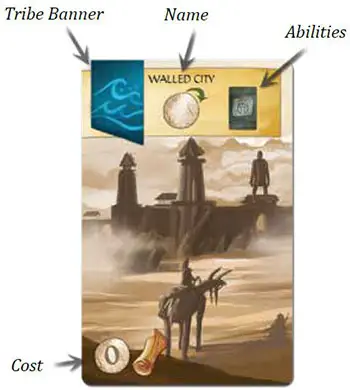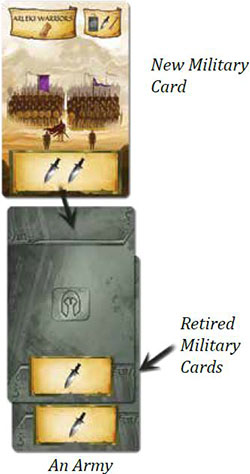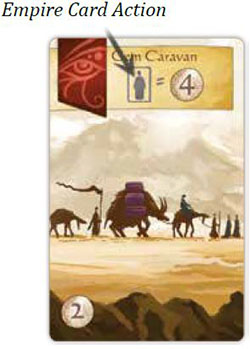
Players may use their citizen tokens on the following actions.

A. Board Actions
Players may send citizen tokens to action spaces on the board. Each action described below has an immediate effect, and some have special rules. Remember, when a player places a citizen on an action space, if there is already a citizen with a higher value, the player must pay an extra coin.
-

Labor
The player collects two coins.
-

Build
The player may pay to build one of the empire cards in the empire card row or any one of the cards from the empire C deck on the board.
Reminder: players can look through the empire C deck at any time.
Additionally, the player must have enough capacity to hold the empire card. Capacity is granted by district cards and titan cards and a player's capital city (found on the player board). Each empire card takes 1 capacity (including the 2 starting empire cards). If the player does not have sufficient capacity, they may not gain a new empire card.

Note: Keep track of your current capacity on the capacity track at the bottom of your player board.
Important: Empire cards are the only cards that require and use capacity! Empire cards each take up 1 capacity, even if damaged.

Empire Card
The player pays the cost in coins and knowledge to the supply and places the empire card to the right of their player board (in the bottom row of cards). Empire cards give bonuses and abilities, described in the sections "Card Abilities" on page 14.
Important: Do not refill the empire card row until the next round.
-

Draft
The player gains 1 sword attack value for each of their citizen tokens on this action. This attack value is granted for the entire round and may be used in multiple titan attack actions.
Example: If a player has 2 citizens on Draft, they have 2 extra swords to use when attacking this round.
-

Expand
The player must pay 1 knowledge or 3 coins to the supply. The player then draws the top 3 cards of the district deck and may choose to keep one of them, placing it in the districts area beside their player board.
District cards grant additional capacity and may grant other abilities. The player places the 2 unchosen cards at the bottom of the district deck and immediately turns the next district card on the deck face up. District cards do not require capacity.
-

Learn
The player may pay 3 coins to the supply to gain 1 knowledge.
-

Rebuild
The player may repair up to 2 damaged empire cards. They flip these cards face up. The player also takes the 1st-player token and flips it so the "hand" side is face up.
This means the token may not be claimed again in the same round. The player also collects 1 coin. If a player already has the 1st-player token when taking this action, they should flip the token.
-

Recruit
The player may recruit one of the military cards in the military card row on the board.
At the start of the game, all players have an army limit of 2 (given by each player's capital city), which means that no player may have more than 2 active military cards. Players can increase the army limit with district and empire cards (as well as some titan cards).

On the player board, the capital city gives an army limit of 2.
Most military cards are free, but some have a cost that must be paid in order to be claimed. The cost is located just under the name. After the player chooses a card and pays the cost (if any), they choose to place it in one of their army slots.
If there are no open army slots, the player must retire an active military card that they already own.
Important: A player may only retire a military card that has not yet been used to attack in the round (meaning the card has no coins on the name area).
To retire a military card, the player removes all coins on the card, returning them to the supply, and flips it over so that the legacy abilities are showing. Legacy abilities represent skills that the old soldiers learned and taught to the new soldiers.
If there are previous legacy abilities, these should also be showing. The player now places the new military card face up on top of the old cards, so that all the legacy abilities are showing from previous active military cards in the army.
Legacy abilities of a military card can also be seen on the front of the card, in the top right corner, but do not take effect until the military card has been retired.
Important: Do not refill the military card row until the next round.

An army consists of one active military card and any number of retired military cards beneath it.
-

Explore
(Available on round 2).
The player may do one of the following:
Draw 5 empire cards from the current empire deck and store 1 of them.
Store 1 of the empire cards on the empire card row on the board.
Store 1 empire card from the empire C deck.
When a player stores an empire card, they place it face down near the bottom left corner of their player board. They should make sure it is placed horizontally to remember that it is not yet built. Then they place any empire cards they drew but didn't store in the discard pile.
Stored cards do not grant any benefits to the player, but the player may buy them later using the "Build Stored" action (which does not take a citizen to use). There is no limit to the amount of stored cards a player may own.
-

Grow
(Available on round 3).
The player gains an additional citizen token by paying 3 coins. The player takes a citizen token in their player color in the lowest skill number possible.
For example, if the player had citizen tokens with a skill of 1,2, and 3, they would gain the citizen token with a skill of 4. New citizen tokens are placed to the left of the player board in the "starving/new" area and may not be used until the next round.
Note: A player does not need an unused food to gain a new citizen, but they need to have 1 food per citizen at the end of each round in order to use all of their citizens in the next round.
B. Empire Card Actions
A player may place one of their citizen tokens on an action on one of their empire cards. The player may only place a citizen token on the action if the card does not already have a citizen token on it.
Players may not place citizen tokens on empire cards owned by other players.
Some empire card actions are described in the "Card Clarifications" section.

Continue Reading

